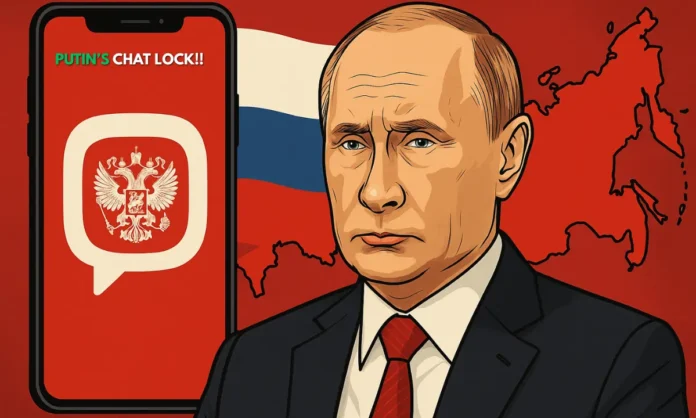SUMMARY
- President Vladimir Putin has signed a law to develop a government-controlled messaging app aimed at replacing WhatsApp and Telegram.
- The move intensifies Russia’s push for digital sovereignty amid concerns over privacy, surveillance, and internet freedom.
- Experts warn that the app could be accompanied by speed throttling of foreign platforms to coerce adoption.
Messaging the Motherland: Why Russia Is Building Its Own App
In a world where global messaging platforms dominate conversations and dissent alike, Russia is taking a starkly different path. On June 25, 2025, President Vladimir Putin signed into law a bill authorizing the creation of a state-backed messaging application, designed to integrate with Russian government services and ultimately sideline foreign players like WhatsApp and Telegram.
The legislation comes at a pivotal moment. Since the 2022 invasion of Ukraine, the Kremlin has accelerated efforts to isolate its digital infrastructure from perceived Western influence. From social media bans to home-grown alternatives like RuTube and VK, Russia’s so-called “digital sovereignty” strategy has gone from slow burn to full throttle. This latest development—the creation of a government-controlled chat platform—signals a deepening shift in how Russia envisions its digital future.
Officials claim the app will offer capabilities that popular foreign platforms do not—especially in integrating with citizen services. But critics and digital rights groups aren’t buying it. They argue the move is less about innovation and more about surveillance, censorship, and control.
Putin authorises creation of state messaging app to combat WhatsApp and Telegramhttps://t.co/S6X1YOnYA7
— Economic Times (@EconomicTimes) June 24, 2025
A Network of Control: What the Law Says and What It Enables
- The app will be integrated with state services to offer “unique functionality.”
- Russian lawmakers say it will operate under full government oversight.
- The Internet Protection Society expects speed limits on WhatsApp and Telegram to pressure users into switching.
- Past examples suggest digital rollouts like this are often paired with increased censorship infrastructure.
The new law sets in motion a government-funded initiative to develop a secure, fully integrated communications tool that will purportedly serve “civilian, bureaucratic, and emergency” needs. Mikhail Klimarev, director of the Internet Protection Society, has warned that the Kremlin may slow down WhatsApp and Telegram to make the state app more attractive—or more necessary.
This wouldn’t be the first time Russia weaponized internet speeds. In 2021, Roskomnadzor, the media watchdog, deliberately throttled Twitter to push compliance with censorship laws. With WhatsApp still used widely across Russia—despite the popularity of Telegram—the state’s next steps may include targeted technical disruption and an eventual legal ban on “non-cooperative” foreign apps.
What Critics Say: Innovation or Isolation?
- The app raises alarm over user privacy and state surveillance.
- Analysts warn this is less about tech independence, more about digital authoritarianism.
- Russia’s shrinking tech ecosystem continues to alienate young users and professionals.
The law’s passage was met with alarm by digital rights advocates and technology experts alike. While state officials are framing the new app as a tool for national resilience, critics see it as another gear in the Kremlin’s surveillance machinery. “This isn’t about offering something better—it’s about making sure users have no choice,” said a Moscow-based tech analyst under anonymity.
The timing also matters. Russia’s domestic tech scene has been in crisis since major global firms pulled out post-2022. Microsoft, Google, Apple, and Meta have all wound down or frozen operations, creating a vacuum filled by state-backed services and Kremlin-aligned startups. For young Russians, many of whom grew up with global platforms, the shift feels suffocating.
Worse, the app could eventually replace messaging functionality within digital identity platforms like Gosuslugi, allowing the state to tie every message sent to a verified user ID. In such a system, anonymity would become impossible—and dissent increasingly dangerous.
Beyond the App: Digital Sovereignty or Isolationist Overreach?
- Russia’s “sovereign internet” model seeks full control over infrastructure, platforms, and content.
- But the model is eroding international trust and risking brain drain.
- The new app is the latest node in an architecture of total state-aligned communication.
The messaging app isn’t emerging in a vacuum. It’s part of a broader campaign that includes the 2019 “Sovereign Internet Law,” giving Russian authorities sweeping powers to control internet traffic, and ongoing efforts to build domestic alternatives to Google, YouTube, and even Wikipedia.
But as Russia doubles down on digital sovereignty, it faces mounting technical and political costs. Brain drain from the tech sector continues, and international isolation is pushing Russia closer to authoritarian digital allies like China. The Kremlin recently signed AI cooperation deals with Chinese firms, suggesting its technological future will lean heavily on Beijing’s blueprint.
This app, then, is not just about communication—it’s about information sovereignty. If implemented as feared, it could represent a final blow to digital pluralism in Russia.
Closing Signal: When a Chat App Is More Than a Chat App
The creation of a government-controlled messaging app may sound like a dry bureaucratic move. But in Putin’s Russia, it is anything but. It’s a continuation of a philosophy that sees free communication as a threat, not a right. The app’s promise of unique features and seamless government service integration may entice some. But the long-term cost will be measured not in convenience, but in privacy, freedom, and the integrity of digital life.
In the end, this isn’t just about replacing WhatsApp—it’s about replacing choice. And that should worry everyone, inside and outside Russia.


